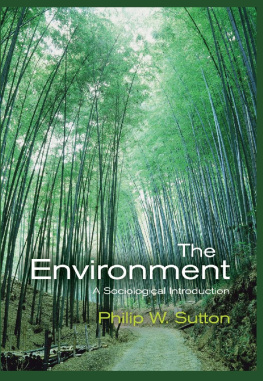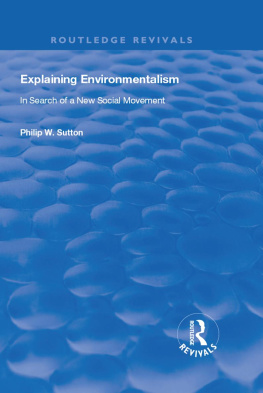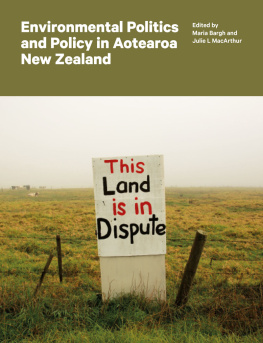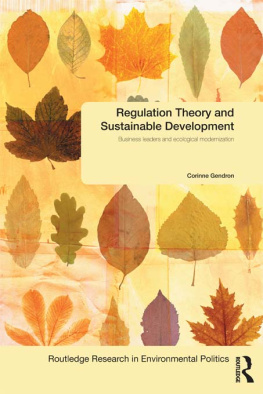The Environment
In memory of James Clarke (19212006), a gentleman
The Environment
A Sociological Introduction
PHILIP W. SUTTON
polity
Copyright Philip W. Sutton 2007
The right of Philip W. Sutton to be identified as Author of this Work has been asserted in accordance with the UK Copyright, Designs and Patents Act 1988.
First published in 2007 by Polity Press
Polity Press
65 Bridge Street
Cambridge CB2 1UR, UK
Polity Press
350 Main Street
Malden, MA 02148, USA
All rights reserved. Except for the quotation of short passages for the purpose of criticism and review, no part of this publication may be reproduced, stored in a retrieval system, or transmitted, in any form or by any means, electronic, mechanical, photocopying, recording or otherwise, without the prior permission of the publisher.
ISBN-13: 978-0-7456-5406-5
A catalogue record for this book is available from the British Library.
Typeset in 9.5 on 12pt Utopia
by Servis Filmsetting Ltd, Longsight, Manchester
Printed and bound in Malaysia by Alden Press, Malaysia
The publisher has used its best endeavours to ensure that the URLs for external websites referred to in this book are correct and active at the time of going to press. However, the publisher has no responsibility for the websites and can make no guarantee that a site will remain live or that the content is or will remain appropriate.
Every effort has been made to trace all copyright holders, but if any have been inadvertently overlooked the publishers will be pleased to include any necessary credits in any subsequent reprint or edition.
For further information on Polity, visit our website: www.polity.co.uk
Acknowledgements
This book did not begin life as a great idea looking for an outlet, but gradually evolved into an idea and book project over the last four years or so. Once I began teaching environmental sociology, or the sociology of the environment, I came to realize that introductory textbooks (now including my own) didnt really introduce the subject matter, but rather discussed and debated it, assuming a knowledge base that many of my new students simply did not have. Sociologists came rather late to the study of environmental issues and, as a result, the latter have just not been a part of the staple diet of sociology students. Therefore, what seemed to be missing was a fairly concise, reliable and welcoming invitation to the sociological study of environmental issues for all of those with little if any familiarity with sociology, environmental issues or both. A suggestion by Emma Longstaff, my editor at Polity, that I should consider writing my own was the start of the process, which led, eventually, to this book. A special thank-you is due to Emma, as, without her knowledge of the publication needs of the discipline, I would probably have waited for someone else to do it. She also managed the project sympathetically and was a constant source of good advice. After becoming convinced that a brief introduction would be useful for a range of Environment and Society courses, a proposal went out for review. I would like to thank David Held and the Editorial Board at Polity, but especially the independent reviewers for their extraordinarily detailed and constructive comments, suggestions and sound advice on the draft manuscript. Stephen Vertigans also read parts of the book and made some helpful suggestions for improvement. I am sure the book is better for these interventions, though obviously I remain solely responsible for any shortcomings that remain.
At The Robert Gordon University, Joyce Lishman has been extremely supportive over a number of years and, importantly for this book, enabled the help of a research assistant over the summer of 2004. A special thank-you to Helen White, who did a brilliant job digging out documentary materials and international examples for the book. I hope that Helen feels a spark of recognition in some of the examples Ive used, though I guess she will also wonder whatever happened to all the rest! Another time perhaps. Thanks also to Roddy Hamilton for invaluable technical advice in sorting out the books image files. A debt of gratitude is again owed to Julian Bell for his usual but inimitable understanding, support and interest, which are always much appreciated. I also acknowledge the contribution of all the students on my Environment and Society course for alerting me to the kind of material that would be most helpfully included in such an introductory-level text.
Lastly, heartfelt thanks to Pat for making the book possible and patiently enduring my seemingly endless revisions to it.
Preface
I make a basic assumption at the outset that anyone picking up this book has an interest in knowing something about the environment, sociology or both. For those interested in the environment, the book will cover some key environmental issues and problems, but will also show them how sociologists think about and carry out research in this area. I will try to convince them that understanding, explaining and solving environmental problems will require sociological knowledge. For those already interested in sociology, the book will try to convince them that they should take environmental issues and problems seriously and that sociologists should be prepared to make the effort to understand evidence from the natural sciences if they are to make their necessary contribution. Of course, should anyone already be interested in both the environment and sociology, they will need no convincing of any of this, but should still find the presentation of material and specific examples helpful.
The book has been written with two specific audiences in mind, namely the (possibly mythical) intelligent layperson and the (hopefully real) new undergraduate student. Some of the former may even metamorphose into the latter before, after or possibly during the reading of this book, though this is by no means necessary. Still, self-evidently the book is sociological and contains some of the staple concerns of the discipline. Most of the time, the sociological content, and particularly the theory, is embedded within the discussions of evidence or delivered with a fairly light touch. In this way the sociological contribution builds gradually and is not separated out from the evidence. My hope therefore is that it will be possible for people with no, a little, or some knowledge of sociology to get something useful from the book. New students of sociology, politics, international relations, geography and environmental science should be able to read it without feeling too overwhelmed by social theory, a fair bit of which I readily admit is unnecessarily verbose.
What led to a textbook of this kind was my gradual realization that despite the existence of many introductions to environmental sociology and the sociology of the environment, all of them have been written for the higher levels of undergraduate or postgraduate study. That means anyone approaching sociology to find out what it might be able to add to their existing knowledge of the environment and environmental issues would probably not find the existing literature that useful, simply because it is written at too high a level and makes the assumption of prior sociological knowledge. This book does not make that assumption. To a lesser extent, teaching my own Environment and Society course has also convinced me that a more basic introduction might even provide a service to higher-level students of sociology. This is because, apart from some brief material on risk, environmental politics and the general rubbishing of all things biological or natural, there really isnt much environment in sociology degree schemes. Even though higher-level environmental sociology students may get along perfectly well with the sociology, their previous lack of acquaintance with environmental issues may have left a gap in knowledge which this book should help to fill. Such a lack of acquaintance does not entirely explain a former student who tried to convince us that genetically modified crops might be part of an extra-terrestrial alien conspiracy to wipe out the human species, but it probably didnt help.
Next page







